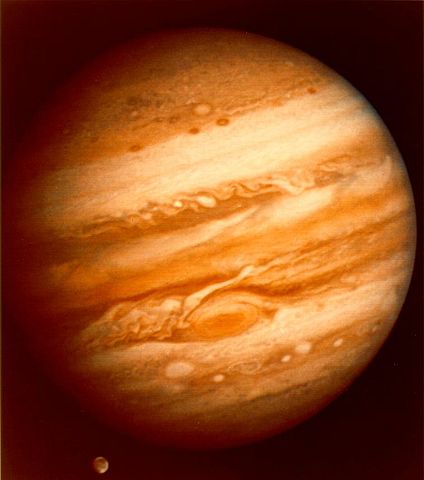 |
This is a file from the Wikimedia Commons. Information from its description page there is shown below.
Commons is a freely licensed media file repository. You can help.
|
English:
Caption: Voyager 1 took this photo of the planet Jupiter on January 24, while still more than 25 million miles (40 million kilometers) away. As the spacecraft draws closer to the planet (about 1 million kilometers a day) more details are emerging in the turbulent clouds. The Great Red Spot shows prominently below centre, surrounded by what scientists call a remarkably complex region of the giant planet's atmosphere. An elongated yellow cloud within the Great Red Spot is swirling around the spot's interior boundary in a counterclockwise direction with a period of a little less than six days, confirming the whirlpool-like circulation that astronomers have suspected from ground-based photographs. Ganymede, Jupiter's largest satellite, can be seen to the lower left of the planet. Ganymede is a planet-sized body larger than Mercury. This colour photo was assembled at Jet Propulsion Laboratory's Image Processing Lab from three black and white images taken through filters.
Česky:
Pořízení fotografie: Sonda Voyager 1 získala tuto fotografii planety Jupiteru 24. ledna 1979, když byla ještě 40 miliónů kilometrů vzdálená. Jak se kosmická loď blížila k planetě (asi 1 milión kilometrů za den), v tubulentních mracích se objevovaly stále nové a nové detaily. Nápadná Velká rudá skvrna zachycená pod středem obrázku je obklopená pozoruhodně složitými oblastmi atmosféry. Protáhlý žlutý oblak uvnitř Velké rudé skvrny víří proti směru hodinových ručiček s periodou méně než šest dnů, potvrzuje tak podobnost vodnímu víru, kterou astronomové předpokládali při pozorování ze Země. Jupiterův největší měsíc Ganymede je vidět poblíž levého spodního rohu obrázku. Podle velikosti by se Ganymede řadil spíše k planetám, je větší než Merkur. Tato barevná fotografie byla sestavena v laboratoři (Jet Propulsion Laboratory's Image Processing Lab) ze tří černobílých fotografií prohnaných filtry.
| Public domainPublic domainfalsefalse |
 |
This file is in the public domain because it was solely created by NASA. NASA copyright policy states that "NASA material is not protected by copyright unless noted". (See Template:PD-USGov, NASA copyright policy page or JPL Image Use Policy.) |
|
|
|
Warnings:
- Use of NASA logos, insignia and emblems are restricted per US law 14 CFR 1221.
- The NASA website hosts a large number of images from the Soviet/ Russian space agency, and other non-American space agencies. These are not necessarily in the public domain.
- Materials based on Hubble Space Telescope data may be copyrighted if they are not explicitly produced by the STScI. See also {{ PD-Hubble}} and {{ Cc-Hubble}}.
- The SOHO (ESA & NASA) joint project implies that all materials created by its probe are copyrighted and require permission for commercial non-educational use.
- Images featured on the Astronomy Picture of the Day (APOD) web site may be copyrighted.
|
File usage
The following pages on Schools Wikipedia link to this image (list may be incomplete):
Wikipedia for Schools is one of SOS Children's Villages' many educational projects. SOS Children is an international children's charity, providing a good home and loving family to thousands of children who have lost their parents. We also work with communities to help vulnerable families stay together and raise children in the best possible environment. You can help by sponsoring a child.





